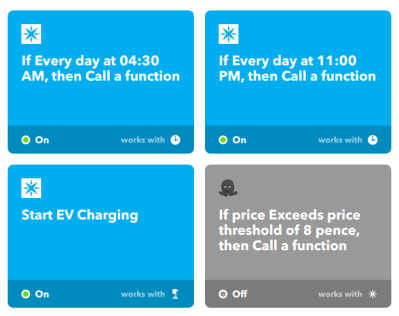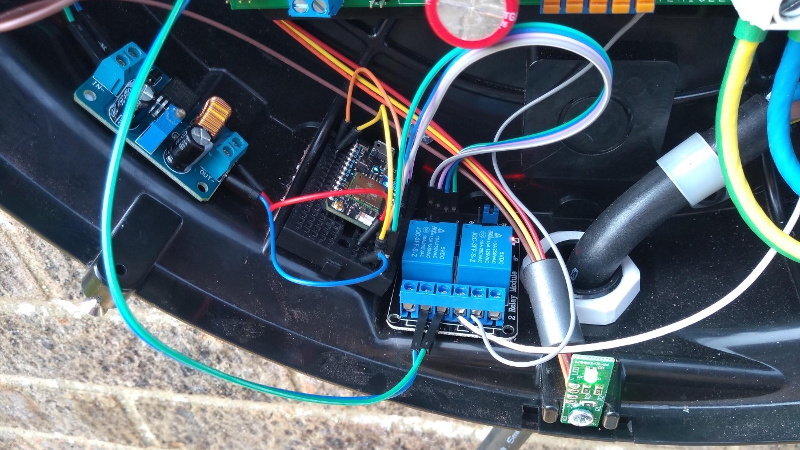Many electric cars feature a timer capability that allows the owner to set which hours they want the vehicle to start pulling a charge. This lets the thrifty EV owner take advantage of the fact that the cost of electricity generally goes down late at night when the demand is lower. The Renault Zoe that [Ryan Walmsley] owns has this feature, but not only does it cost him extra to have it enabled, it’s kind of a hassle to use. So being an enterprising hacker, he decided to implement his own timer in the charger itself.
 Now controlling high voltages with a lowly microcontroller might sound dangerous, but it’s actually not nearly as tricky as you might think. The charger and the vehicle actually communicate with low-voltage signals to determine things like the charge rate, so it turns out you don’t need to cut into the AC side of things at all. You just need to intercept the control signals between the two devices and modify them accordingly.
Now controlling high voltages with a lowly microcontroller might sound dangerous, but it’s actually not nearly as tricky as you might think. The charger and the vehicle actually communicate with low-voltage signals to determine things like the charge rate, so it turns out you don’t need to cut into the AC side of things at all. You just need to intercept the control signals between the two devices and modify them accordingly.
Or do you? As [Ryan] eventually realized, he didn’t need to bother learning how the control signals actually worked since he wasn’t trying to do anything tricky like set the charge rate. He just wanted to be able to stop and start the charging according to what time it was. So all he had to do was put the control signal from his car through a relay controlled by a Particle Photon, allowing him to selectively block communication.
The charger also had an optional key lock, which essentially turns the controller off when the contacts are shorted. [Ryan] put a relay on that as well so he could be absolutely sure the charger cuts the juice at the appropriate time. Then it was just a matter of getting the schedule configured with IFTTT. He mentions the system could even be tweaked to automatically control the charger based on the instantaneous cost of electricity provided by the utility company, rather than assuming overnight is always the most economical.
We’ve seen a fair amount of electric car hacking, but with only a few exceptions, the projects always steer clear of modifying the actual chargers themselves. In general hackers feel a lot safer playing around in the world of DC, but as [Ryan] has shown, safely hacking your EV charger is possible if you do your homework.
















Umm great learning experience for you and all that, well done for getting it to work.
But why not just use a timer where it plugs into mains? You know, like those $5 ones from your local big box store.
Also I dont think breadboard is intended for permanent, your connections will not be reliable over time.
Well as already mentioned in the article this method allows me in the future to switch to my suppliers half hourly tariff where it can be cheaper to charge in the day than the night, a dumb timer wouldn’t let me do this.
Second, this is an EV charger which is connected into the incoming mains supply with an RCBO inbetween, it’s 32A at 240V. While I’m fairly confident with electrics I can’t safely isolate it enough to install. Furthermore most timers can’t handle 32A and likely would try if it cut the car off mid charging.
Thirdly congratulations for being obvious with breadboards. I’ll likely move it to a PCB soon, however I wanted this mod to be easy to reverse. Furthermore it’s in an enclosed case.
Hello mr. Walmsley,
I read your piece about your EO EV charger, and how you managed to control it over rs485 with a laptop. I’m interested in doing this through the original RPi. Any possibility to get in contact?
If you seriously think you can control an EV charger with a $5 lamp timer, you clearly don’t know enough about the topic to even comment on it.
Even for 115V charging you’d need to spend a bit more than $5, that only gets you a 5A/600W lighting timer. You’d probably want to be spending $30 or so on one you could be reasonably sure wasn’t gonna burn your house/garage down.
Fair call did suspect you were switching >10A as I typed. Beefy SSR + 555 =P
This would cost more than using parts out of my boxes. Plus also wouldn’t be good enough for UK electrical regulations.
“Umm great learning experience for you and all that, well done for getting it to work. But why not…”
Ummm… because Hackaday!
Which country is this? While the idea of variable electricity prices is in principle a good one, virtually everybody in the UK has a fixed cost tarrif.
Same country as you, UK. Some providers such as Octopus offer EV Tariff where you get 4 Hours at discounted rates. Octopus and Bulb are also offering different variable tariff now and there’s always the classic Economy 7.
You can see details at https://octopus.energy/agile/, https://octopus.energy/go/ and https://bulb.co.uk/smart/
Ryan is based in the UK. Quite a few of the more modern suppliers are moving to variable rates esp when things like solar panels are incorporated.
It’s the UK. I’m guessing you’ve not yet seen the super cheap 5p per kWh Octopus nightly EV tariff?
https://www.octopusev.com/octopus-go
If you use this it means you can drive approx 300 miles on a £5 charge.
I’m not sure on the rules on Hackaday but if he’s allowed I’m sure Ryan can post his recommendation link which will give you £50 off your first bill. I would post mine but that wouldn’t be fair since Ryan did all the work ;)
Australia, for exampe, has Peak and Off-Peak prices based on time of the day.
Is that we are talking about?
Also one Australian supplier had (past tense) special pricing for EV charging at home.
Doesn’t “Economy 7” exist any more?
Where I live (PECO customer in the USA) PECO had a pilot program for this end in 2014. In the 70’s and 80’s this was briefly available as well.
Why is the manufacturer charging extra for this feature in the first place?
The manufactuer charges £50 extra to have the lock on the device. They sell it as a “Smart” charger which can do features like this already despite it not being able to. Wasn’t worth arguing and provided a nice thing to hack.
Greed
I’m on TVA in the US through an electric co-op and my electricity is always billed at the same rate. And even though my bill has gone up over the years (I keep adding more servers!) I don’t think the basic rate has changed in the ~14 years I’ve lived in my current house. I suppose this will change… a few years ago they went with “smart” meters so some guy doesn’t have to come out once a month to read it.
Yeah smart meters are enabling a lot of companies to do newer tariffs which some people like and don’t.
The one I’m with also offers a different half hourly tarrif which can vary as low as 7p a unit in the day and night and usually 30p a unit in peak hours. Because it changes every day for a few days it actually went to negative 2p which meant you were paid to use electric.
However as we use a fair bit in peak hours the EV tarrif with 4 hours a night at 5P and the daytime the same as their non EV tarrif results in the best savings.
“actually went to negative 2p which meant you were paid to use electric”
I wouldn’t mind if this were teh case with smart meters but that you mention the 30p/kw peak rate, this is double a standard tariff.
sadly that’s where smart meters are really going.
Now if alarms went off when it went neg 2p and I could suck as much as my 50A supply could give me to charge various batteries, immersion heaters, the pool, generate hydrogen, etc, then sure there is a positive.
But I suspect it’s going to be on average more like 30p/kw
According to the data it’s more like 12-13p if you don’t do anything.
If you make efforts to minimise peak use, the average drops.
If you charge cars & house batteries & heat water, the cost drops even more.